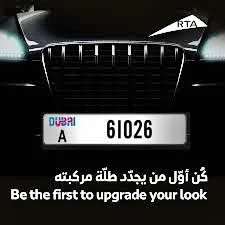Following the introduction of a new number
plate design last year, the Roads and Transport Authority (RTA) has now kicked
off a campaign urging all motorists to upgrade to the new plates, ahead of mandatory
upgrades from July for select codes.
The upgrade is currently available for all
types of distinguished and special number plates across all codes, and from May
it will also be available optionally for unowned (allotted randomly through
vehicle registration) plates.
According to RTA, over the next couple of
years, all categories of vehicle number plates will have to be replaced. As the
RTA presses ahead with its new plates regime, unowned car plates with codes A,
B and C will be among the first to be up for mandatory replacement from July.
The new number plate design that includes
either a black and white or colour Dubai logo, depending on the amount you pay,
was launched last year after the introduction of double codes necessitated a
redesign.
“The RTA has developed a new strategy for
number plates resulting in a new generation of number plates with double codes.
This has accordingly resulted in the whole design for the number plates to be
changed to adopt the single and double codes with the same design language,”
said Sultan Al Marzouqi, director of RTA’s Vehicle Licensing.
The double codes are being introduced as the
RTA is running out of single codes, as the number of vehicles continues to rise
at an alarming rate in Dubai.
Replacement in 2 years
According to RTA, over the next couple of
years, all categories of vehicle number plates — whether purchased online,
bought in an auction or allotted through the vehicle registration process —
will have to be replaced in phases.
In the next phase, beginning January next year,
plates with codes D, E, F, G, H and I will have to be replaced, while in
January 2020 replacement for codes J, K, L, M, N and O will start and following
that in January 2021, it will be the turn of all unowned plates with codes P to
Z as well as other types of plates.
Depending on the size of the plates and colour
of the logo, the prices of the plates vary.
A regular short number plate with a black and
white logo will cost Dh35, while a long number plate in the same category will
cost Dh50.
For those who already own number plates with the
colour logo of Dubai, the replacement for
the long and short plates will cost Dh35 and Dh50, respectively, while those
who want to buy a new plate with coloured Dubai logo will have to pay Dh400 irrespective
of the plate’s size.
As for the distinguished or special number
plates, the replacement will cost Dh500, with the process to be completed
mandatorily by the end of this year.
Al Marzouqi said motorists with owned number
plates willing to get the plates replaced can either proceed immediately to any
of the RTA-affiliated vehicle testing and registration centres or get it
replaced at the time of their scheduled renewal, while those with unowned
number plates can wait till May to do the same





